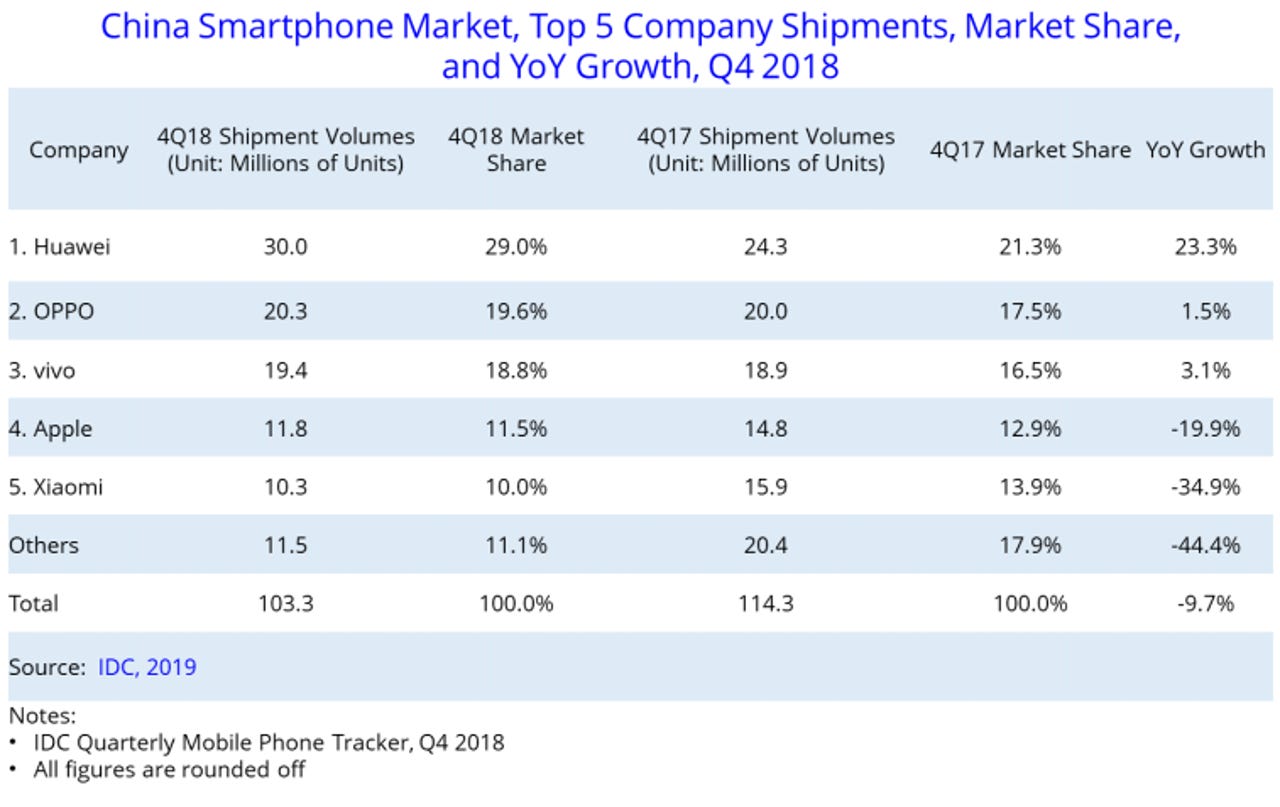Huawei continues dominance as China's smartphone sales slow in Q4: IDC

Smartphone shipments in China dropped to 103 million units during the fourth quarter of 2018, down 9.7 percent year on year for the corresponding period, according to a report [PDF] from the International Data Corporation (IDC).
IDC said the drop is due to a combination of factors, including economic pressures, longer replacement cycles, and smaller wallet share.
Chinese brands Huawei, Oppo, and Vivo -- who were ranked first, second, and third, respectively, in the smartphone market during Q4 2018 -- increased their amount of smartphones sold to 30 million, 20.3 million, and 19.4 million, resulting in year-on-year quarter growth of 23.3 percent, 1.5 percent, and 3.1 percent, respectively.
Apple and Xiaomi -- the fourth- and fifth-largest vendors in China -- experienced declines in Q4 sales, IDC said, only selling 11.3 million and 10.8 million, respectively, compared to the 14.8 million and 15.9 million smartphone units they had sold a year prior for the same quarter.
The top five brands had a combined market share of 91.4 percent in China in Q4 2018, an improvement from 82.1 percent in 2017 for the same period, which IDC said suggests smaller vendors are being squeezed out of the market.

Huawei's strong growth in the Chinese market is due to its decision to provide various offerings through different product lines -- the P, Honor, and Mate series smartphones -- which has improved the company's brand reputation in China, according the IDC report.
However, it has not been all sunshine and roses for Huawei, with the company facing counts for conspiracy to defraud the United States; conspiracy to violate the International Emergency Economic Powers Act (IEEPA); violating the IEEPA; committing money laundering; and obstructing justice. An indictment against CFO Meng Wanzhou claims that during meetings with an unnamed banking institution in the US, she misrepresented Huawei's ownership and control of Iranian affiliate Skycom, as well as its compliance with UN, US, and EU sanctions.
The company is also facing allegations in a separate indictment that it conspired to steal intellectual property from T-Mobile and subsequently obstructed justice. The alleged activity occurred during 2012-13, and is related to Huawei's attempt to build a robot similar to the one T-Mobile was using to test mobile phones.
Xiaomi failed to expand in China despite rapid development outside of its home country, IDC said. The report says Xiaomi will need a clear position for its two brands, Xiaomi and Redmi, after it decided to split Redmi's budget phone offerings into a separate brand to help its main Xiaomi brand target higher prices.
Meanwhile, Apple experienced its third straight year of declines in smartphone shipments, in a move that the report says is attributed to its smartphones receiving sharp price increases.
In reaction to the poor sales in China, Apple CEO Tim Cook had announced in January that the company would cut the price of certain iPhone models outside the US market to counteract the stronger US dollar increasing the price differences, according to Reuters.
Apple also lowered its revenue guidance for the first quarter of 2019, citing the rough Chinese market conditions and fewer iPhone upgrades than expected.
Smartphone fashion show: Nine beautiful smartphones prove they aren't all black slabs
Related Coverage
Smartphone shipments in China dip to lowest level since 2013
Huawei dominated the Chinese smartphone market in 2018, while Apple and Xiaomi declined.
Over 800 million WeChat users sent digital monetary gifts during Lunar New Year
The record number came after the Chinese technology giant announced last month that daily active users of its popular WeChat service exceeded 1 billion.
Apple iPhone sales: Global shipments 'down by millions' in Q1 2019
iPhone shipments fell in Q4 2019, but the active installed base of iPhones now exceeds 900 million.
Chinese handsets continue making inroads in Europe as mid to low end get squeezed
Samsung and Apple are doing well, as Sony, LG, and Wiko feel the pain.
China vs. the US: How governments and markets influence tech innovations (TechRepublic)
Quantitative futurist Amy Webb discusses her experiences watching the rise of smartphones while living in China, and how the East's approach to technology runs parallel to that of the US.